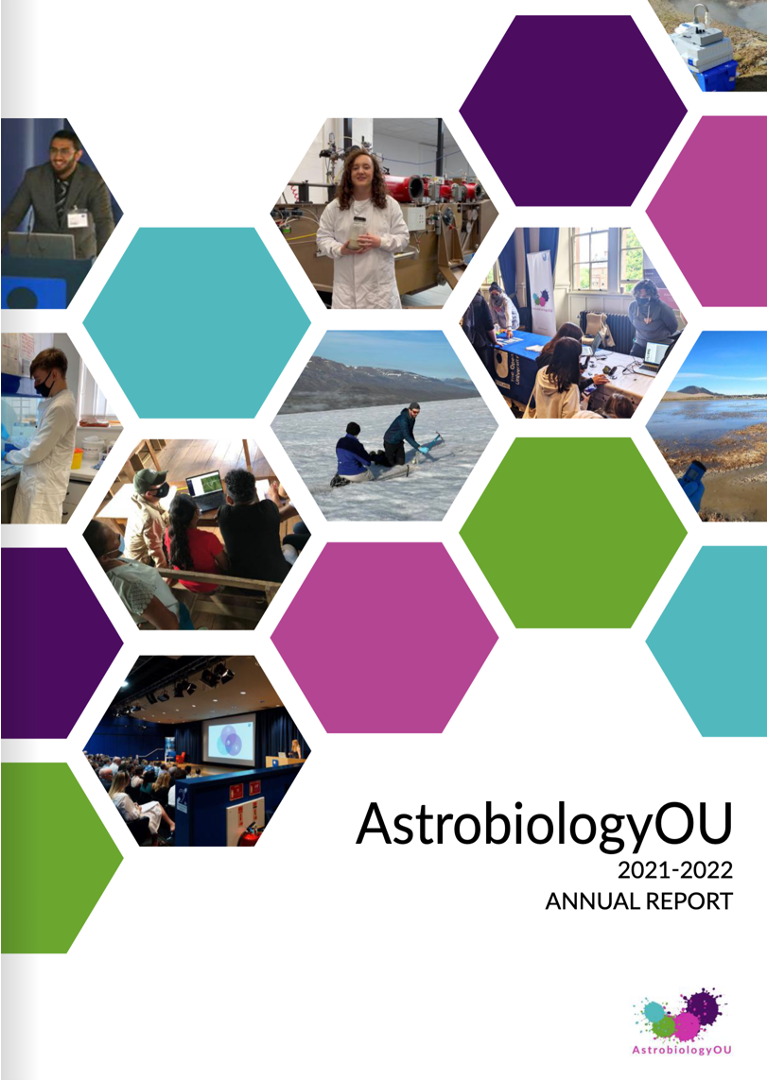You are here
- Home
- About AstrobiologyOU
About AstrobiologyOU
We are a multidisciplinary research group working collaboratively to address the scientific, governance and ethical challenges associated with the advancement of astrobiology and related space exploration missions.
We are based at The Open University in Milton Keynes, UK, where we have extensive laboratory and office facilities to support our members.
Our membership is drawn from the School of Earth, Environment and Ecosystem Sciences and the School of Physical Sciences within the faculty of Science, Technology, Engineering and Maths, as well as from the Faculty of Business and Law and the Faculty of Arts and Social Sciences,
We have an excellent professional services team of technical staff who support our laboratories and those working within them, and a Support Hub who provide day to day operational support for all members of AstrobiologyOU.
We are supported by funding from Research England, who provided £6.7 million to facilitate our expansion, as well as The Science and Technology Facilities Council,
the UK Space Agency, the European Space Agency, the European Union, the Leverhulme Trust, and commercial endeavours. If you’d like to work with us, please get in touch!
Members of AstrobiologyOU contribute to developing and delivering formal and informal teaching across the three faculties we are aligned to.
We have a dedicated astrobiology collection on the Open University’s free learning platform Open Learn, including short courses, articles and interactive learning.
We are committed to developing the next generation of astrobiologists and space sector workers, including through PhD studentships, internships, and education and engagement activities. We endeavour to be inclusive in all activities and work to principles of equality, diversity, inclusion and accessibility.
Have you ever looked up at the stars and wondered are we alone?
It's one of those fundamental questions that humans have thought about for thousands of years and the search for that answer is what drives the field of astrobiology.
Astrobiology is the study of life in our universe and it brings together lots of different types of science, such as Biology Chemistry, Physics, Geology and Astronomy.
Astrobiologists want to find out how life began, how it evolved and where in the universe we might find it.
The best example we have of life is the life we have here on earth.
On earth we find life everywhere that there is liquid water, so when we look for where life is on other planets we look for evidence of liquid water.
Mars used to be much wetter and warmer than it is today, with similar conditions to that of Earth when life evolved here.
We can see evidence of dried up river channels and lakes on Mars, so maybe Mars could have supported life.
How would we tell that there was life there?
We could look for footprints from little green aliens but that would be unlikely.
Astrobiologists think that life elsewhere in the universe is probably microscopic.
So how would you detect these microscopic lifeforms?
You could look for things that the microbes have left behind.
Astrobiologists call these biosignatures.
There is a complication though.
Life exists pretty much everywhere on earth, including in some of the harshest environments.
We find microscopic life at the bottom of the oceans, inside glaciers, in the deserts, even high up in the atmosphere.
The organisms that can survive these extreme conditions are called extremophiles.
Different extremophiles can tolerate extremes of pressure, temperature, radiation, salinity, acidity or can live without sunlight or oxygen.
There are places with these conditions on Earth, similar to those we might find elsewhere in the universe.
So astrobiologists use these analogue sites to understand if and how organisms live in these environments.
But that just covers life as we know it.
What about extraterrestrial life?
NO, I'm not talking about those little green things again.
What if life could exist on Europa, one of the moons of Jupiter?
Europa is about the same size as our own moon but it's covered by a shell of ice.
Underneath the ice is an ocean.
What if there was life there?
What would it look like?
To find out more we need to send instruments into space to explore these distant worlds.
So it seems like astrobiologists have lots of work to do and lots of questions to answer.
But we can probably sum up all of those questions into one big question:
"Are we alone?"
AstrobiologyOU use knowledge and expertise from lots of different areas including biology, chemistry, physics, law, education, economics, technology and international development. Created for AstrobiologyOU by Stacy Phillips.
View our annual reports
Our Annual Reports showcase all that the group have achieved in previous years

